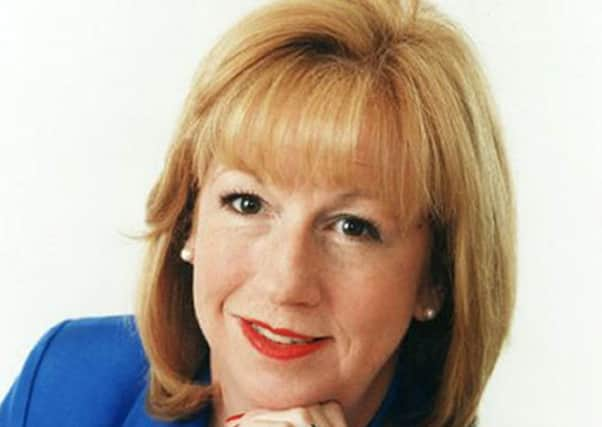Interview: Scottish Tory MP Eleanor Laing on her bid to replace John Bercow


Follow the road out of Paisley towards the Ayrshire coast at Largs, and you’ll pass a sign at the edge of the first village along the road.
“Elderslie,” it reads, beneath some medieval heraldry of a sword wielding knight. “Birthplace of Sir William Wallace.”
Advertisement
Hide AdAdvertisement
Hide AdYou’d be forgiven for believing it was the product of municipal nationalism. But as Tory MP, deputy Commons Speaker, and daughter of Elderslie Dame Eleanor Laing explains: “William Wallace is not the exclusive property of the Scottish National Party.”
It was her father, a former district council chairman, who arranged in the early 1970s to have the sign put up and raised money for a monument to Wallace in the village to be restored. One of Laing’s sons has Wallace as his middle name, and with a hint of mischief, she adds: “If I’d been around in the 13th century, then I would have supported William Wallace.”
Laing, elected in 1997 as MP for Epping Forest in Essex, is the only Scot in the other election - the race to succeed John Bercow as Commons speaker. Her west of Scotland upbringing, she says, is central to how she would approach the job.
Like most of the candidates, Laing has pledged to take some of the drama out of the Speakership, and avoid Bercow’s flamboyant, often hectoring style. She has called for a comprehensive review of the governance of the Commons, which has been plagued by accusations of bullying and sexual harassment that outdated employment and complaints procedures have failed to tackle.
Laing, who worked around Parliament for eight years before becoming an MP, has seen things improve, but not enough. “It’s based on a hierarchy, an old fashioned hierarchy, where there’s a man at the top with lots and lots of power, and then everyone else falls in under that,” she says. “Well, that’s not how I see things.
“Of course it’s not the Scottish way, is it? Our constitutional heritage is that power comes from the people to Parliament. Power comes from the bottom up, not from the top down, and so should the way in which the House of Commons is governed.”
While insisting she doesn’t want to be overly critical of Bercow, Laing adds: “We’ve had a series of Speakers who I think have rather liked having enormous power… it is extraordinary that the office of Speaker of the House of Commons is totally unaccountable. It’s accountable to nobody.”
On being elected the first female president of the University of Edinburgh Students’ Association, Laing was described by the student newspaper as “a cross between Margaret Thatcher and Scarlett O’Hara”. “I was delighted,” she says.
Advertisement
Hide AdAdvertisement
Hide AdShe describes being “quite shocked” after coming to work in London as a solicitor “at how static everything was, at how some people talked down to other people”.
“There was an attitude that if you weren’t from London or the Home Counties, and you haven’t been to Oxford or Cambridge, then there was something a bit inferior about you.
“And of course, that just makes you fight back. I’m a feisty Scot – that just makes you fight back.”
She has not been afraid to appeal to fellow Scots for support. When MPs gather on Monday to elect a new Speaker to chair the House of Commons, Scottish Nationalists will be likely to represent the swing votes.
There are several high-profile Labour candidates, but she is the most prominent Tory; as the hopefuls are whittled down in successive ballots, her supporters believe party loyalty and a few SNP votes could see her beat Labour favourites Harriet Harman, Chris Bryant or Lindsay Hoyle in a head-to-head.
That’s why Laing has written to SNP MPs to ask “personally and directly” for their vote, and telling them she understands their “frustrations with the way things are done in the Chamber, based on the outdated two-party system”.
Laing has pledged to “give greater weight to the third party” as Speaker in debates, and has said she will look into the problems faced by the parents among the Scottish MPs, whose children have different term times from parliamentary recess dates that are set by the English school calendar.
When she sits down with The Scotsman, she suggests other reforms designed to appeal to Scots. Laing doesn’t support electronic voting, saying it’s important that ministers can be cornered by backbenchers during votes. “I have always taken the view that walking through the division lobbies is an important part of a member of Parliament’s job, because that’s where you meet other people,” she says.
Advertisement
Hide AdAdvertisement
Hide AdBut votes that take 15 minutes each and run late into the night could be made more practical, “possibly by having them at a fixed time, like in the Scottish Parliament. That works in Edinburgh. It might well work in London.”
Laing is also highly critical of English Votes for English Laws, controversially introduced by David Cameron immediately after the 2014 independence referendum to stop Scottish MPs from voting on devolved matters at Westminster that only affect England.
“I have never liked English Votes for English Laws,” she says. “Everyone who is elected to this UK Parliament should be an equal representative of the constituency for which they were elected. And I don’t believe in having two classes of employees.
“Of course, it wouldn’t be up to the next Speaker to change it. But it might be up to the next Speaker to point out to the government the failings of the system.”